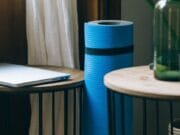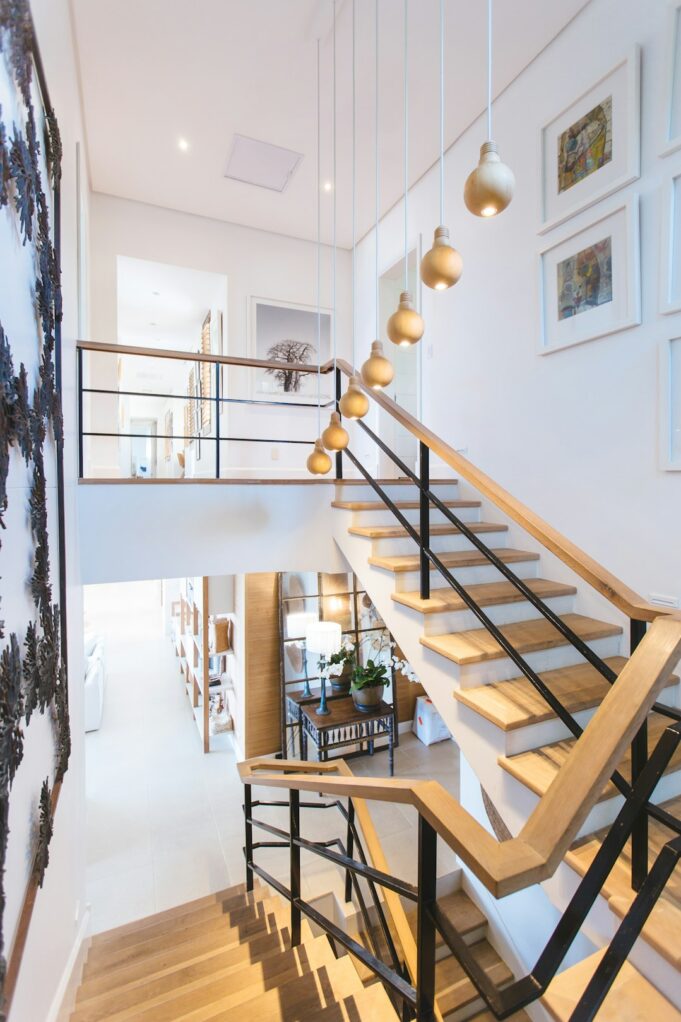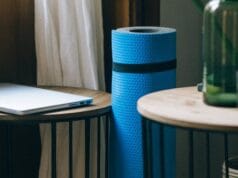In the realm of home fitness, the pursuit of space-efficient and versatile solutions has become increasingly paramount, particularly in urban environments where square footage is at a premium. One innovative approach that has garnered attention is the conversion of customary staircases into functional fitness zones.This progressive concept not only reimagines the use of frequently enough-overlooked vertical spaces but also addresses the growing demand for convenient at-home workout solutions. By employing a strategic blend of design ingenuity and fitness functionality,staircase conversions present an possibility to enhance both the aesthetic and practical value of residential interiors. This article will analyze the multifaceted benefits of staircase fitness conversions, exploring their potential to optimize space, encourage physical activity, and adapt to diverse fitness needs, thereby revolutionizing how homeowners engage with their fitness routines. Through a extensive examination of design principles, user experiences, and best practices in implementation, we aim to uncover the transformative potential of this innovative approach within the broader context of contemporary home wellness trends.
Exploring the Concept of Staircase Conversions for Home Fitness
The concept of transforming staircases into functional fitness spaces is gaining momentum in the realm of home wellness. Staircase conversions serve as a dynamic solution for those seeking to elevate their fitness routines without the need for extensive equipment or dedicated gym spaces. By effectively utilizing these often-overlooked areas, homeowners can enhance their cardiovascular health and build strength through varied exercises that incorporate not just the steps themselves, but also the surrounding space. For instance, if you’re curious about how to integrate vertical workout installations safely, you might find our Guide to Installing Vertical Fitness Equipment Safely very insightful. The benefits of this innovative approach include:
- Space Efficiency: Utilizing existing structures minimizes the need for additional square footage dedicated to fitness.
- Cognitive Engagement: Stair workouts require coordination and focus, promoting mental sharpness alongside physical fitness.
- Variety of Exercises: A range of exercises such as step-ups, lunges, and jumps can be performed, offering comprehensive workout options.
Moreover, the integration of technology can further enhance the effectiveness of staircase workouts. Advanced tracking systems and fitness applications allow users to monitor their performance, set goals, and receive tailored feedback directly related to their staircase routines. Below is a comparative overview of popular fitness tech that can complement staircase workouts:
| Device/App | Features | Price Range |
|---|---|---|
| Fitness Tracker | Heart Rate Monitoring, Step Count | $50 – $150 |
| Fitness App | Personalized Workouts, progress Tracking | Free – $30/month |
| Smart Scale | Body Composition Analysis, Syncs with Apps | $70 – $200 |
Evaluating the Benefits of Integrating Fitness Solutions into Stair Design
Integrating fitness solutions into staircase design is not only an innovative trend but a strategic approach to enhancing the overall living habitat. The incorporation of features such as adjustable step heights, handrails designed for resistance training, and additional grips can transform a basic staircase into a versatile fitness tool. Homeowners can easily turn their daily routines into opportunities for physical activity, thus promoting a more active lifestyle without the need for a dedicated workout space. Moreover, if you’re exploring how unused parts of your home can be transformed, consider checking out our article on Repurposing Unused Corners for Fitness in Small Homes, which offers creative ideas to maximize every inch of space.
Furthermore, this integration encourages family participation, making fitness a communal and enjoyable endeavor.
The benefits extend beyond mere physical fitness; thay also encompass psychological well-being. A beautifully designed staircase with fitness functionality can serve as a centerpiece in the home, positively affecting mood and motivation. Moreover, implementing these solutions can help reduce the risk of lifestyle-related health issues.consider the following key advantages of integrating fitness components into staircase design:
- Space Efficiency: Maximizes utility in smaller homes.
- Increased Daily Activity: Promotes movement throughout the day.
- Cost-Effectiveness: Eliminates the need for expensive gym memberships.
- Customizability: Can match personal fitness goals and design preferences.
Key Design Considerations for Effective Staircase Fitness Conversions
when transforming a staircase into a fitness space, the layout plays a crucial role. Identify the specific workouts you intend to perform—ranging from bodyweight exercises to aerobic routines. Consider the dimensions of the staircase; wider stairs can accommodate more versatile training options, while narrower ones may limit movement. Additionally, ensure that the conversion maintains safety standards: using non-slip materials, installing handrails, and providing adequate space for maneuvering can significantly reduce the risk of injury during workouts.
Another essential factor is the accessibility and functionality of the space. Create a user-friendly setup that allows seamless transitions between exercises.Populating the area with modular equipment like resistance bands or foldable benches can enhance flexibility and workout efficacy. Lighting is also a vital element; proper illumination can motivate users and improve visibility during exercise routines. Evaluate the potential for multi-purpose use—transforming the staircase fitness area into a functional spot for relaxation or socialization can maximize its utility, ultimately fostering a more balanced living environment.
Recommended Equipment and Modifications for Enhanced Personal Training
To maximize the potential of your innovative staircase conversion, selecting the right equipment is crucial.The following items can significantly amplify your personal training sessions:
- resistance Bands: Ideal for strength training, these are versatile and easy to store, making them perfect for a staircase setup.
- Step Platform: This can enhance cardio workouts and improve agility, allowing for various exercises such as step-ups and lateral movements.
- Dumbbells: A set of adjustable dumbbells provides flexibility, enabling users to target specific muscle groups while utilizing the stairs.
- Balance discs: Incorporating balance training can enhance core stability, making workouts more challenging and dynamic.
In addition to equipment, consider making the following modifications to your staircase for a more comprehensive training experience:
| Modification | description |
|---|---|
| Non-Slip Surface | Adding a non-slip coating increases safety during workouts. |
| color-Coded Markers | Use tape or paint to indicate different workout zones or levels on the stairs. |
| Handrail Height Adjustment | Modify the height for better grip during exercises requiring support. |
Safety and Maintenance: Ensuring Long-Term Efficacy of Staircase Fitness Solutions
to maximize the longevity and effectiveness of staircase fitness solutions, ongoing safety precautions and routine maintenance are imperative. Regular inspection of the stair panels and their attachments is essential to prevent deterioration wich can lead to accidents. Users should ensure that no loose fittings are present, and the surface remains free of dust and moisture. A swift assessment of structural integrity can identify wear and tear early, allowing for repairs before serious issues arise. Consider implementing the following safety protocols:
- Daily Inspections: Check for loose hardware or structural damage.
- Surface Cleanliness: Keep stairs clean and dry to prevent slippage.
- Proper Usage Guidelines: Establish and communicate safety rules to users.
In addition to safety measures, regular maintenance is crucial to ensure that the fitness benefits of your staircase conversion remain optimal over time.Routine care not only extends the life of the installation but enhances user experience. Schedule periodic evaluations to check the equipment’s fitness and stability,including evaluating tread surfaces for wear. The table below outlines suggested maintenance tasks and their frequency:
| Maintenance Task | Frequency |
|---|---|
| Inspect Structural Components | Monthly |
| Clean Stair Surface | Weekly |
| Check and Tighten Fastenings | Quarterly |
| evaluate User Safety Guidelines | Annually |
Q&A
Q&A on Innovative Staircase Conversion for Home Fitness
Q1: what is staircase conversion for home fitness, and how does it work?
A1: Staircase conversion for home fitness refers to the innovative change of traditional staircases into multifunctional exercise spaces. This concept leverages the existing vertical space of a home, allowing homeowners to integrate workout solutions that do not require notable alterations or additions to their property. The staircase can be adapted to include features such as resistance bands, pull-up bars, or even foldable equipment, effectively utilizing steps as a platform for various exercise routines. This approach not only maximizes space but also encourages physical activity in a convenient and accessible environment.
Q2: What are the primary benefits of converting a staircase for fitness purposes?
A2: The primary benefits of staircase conversion include space efficiency, convenience, and versatility. Homeowners with limited square footage can benefit from the ability to incorporate exercise into their daily routine without the need for a separate gym area. Moreover, staircases are inherently designed for movement, making them an ideal structure for exercises that enhance cardiovascular health and lower-body strength.This conversion promotes a lifestyle centered on fitness by making workouts readily available, thereby reducing barriers to regular activity. Additionally, such structures can contribute to aesthetic enhancement, providing a modern and innovative design element to the home.
Q3: What types of exercises can be performed with a converted staircase setup?
A3: A converted staircase can facilitate a wide range of exercises targeting different muscle groups. Common activities include stair climbing, step-ups, lunges, and various plyometric exercises. Furthermore, accessories like resistance bands can be anchored to the staircase for strength training routines, while pull-up bars installed above the staircase can enhance upper body workouts. Core exercises, such as incline push-ups or elevated planks, can also be executed on the stairs. This variety ensures that users can engage in both aerobic and anaerobic workouts, catering to diverse fitness goals.
Q4: Are there any safety concerns associated with staircase conversions for fitness?
A4: Yes, while staircase conversions present numerous advantages, safety must remain a paramount consideration. Proper stabilization of any installed equipment is essential to prevent accidents during use. Moreover,the staircase should be maintained in meticulous condition,with attention to traction and surface integrity to reduce the risk of slips. Users should also be educated on proper form and techniques to avoid injuries, particularly when engaging in dynamic movements. Thus, prospective converters should consider consulting with fitness professionals and design experts to ensure that their installations prioritize safety without compromising functionality.
Q5: How can homeowners get started on a staircase conversion for fitness?
A5: Homeowners interested in staircase conversion should begin by assessing their available space and determining the desired functionalities of their fitness setup. Researching and selecting appropriate equipment that fits within the stairwell’s dimensions is critical. It is indeed advisable to sketch out a design or consult with an architect experienced in multifunctional space use. Additionally, homeowners should explore flexible and modular equipment options that can adapt to their evolving fitness needs. A phased approach to implementation may be beneficial, allowing for gradual integration of workout components while monitoring usability and safety.
Q6: Are there any emerging trends in staircase conversions for home fitness?
A6: Emerging trends in this niche include the incorporation of smart technology within staircase fitness systems, such as integrated fitness trackers or virtual coaching apps that guide users through workouts. Sustainable design practices are also becoming prominent, with an emphasis on using eco-friendly materials for any modifications. Furthermore, the aesthetic appeal is gaining significance, leading to the development of visually striking designs that harmonize fitness with home décor. as urban living spaces continue to be challenged by space constraints, the growth of innovative staircase conversions for home fitness signifies a progressive shift towards multifunctionality in interior design.
To Conclude
the trend of innovative staircase conversions for home fitness represents a significant evolution in the way we approach exercise within our living spaces.By reimagining an frequently enough-overlooked architectural element, homeowners are not only maximizing their use of vertical space but also embedding physical activity seamlessly into their daily routines. This approach emphasizes the importance of multifunctional design, where fitness becomes an integral part of home life rather than an afterthought.
As we transition into a more health-conscious society, the ability to integrate fitness solutions into our environments will likely influence architectural and design practices. Future developments in this area may include advanced materials and technologies that enhance the safety and efficiency of these conversions, ensuring a diverse array of options tailored to varied lifestyles and preferences.
Ultimately, the staircase conversion exemplifies the intersection of form and function, illustrating how innovative design can foster an environment conducive to well-being. The implications for home fitness extend beyond mere convenience; they challenge conventional notions of exercise, promoting a holistic understanding of health that incorporates movement as a natural, everyday activity. As we continue to explore and invest in such innovative solutions, the potential to reshape our homes—and by extension, our lives—remains profound.




















